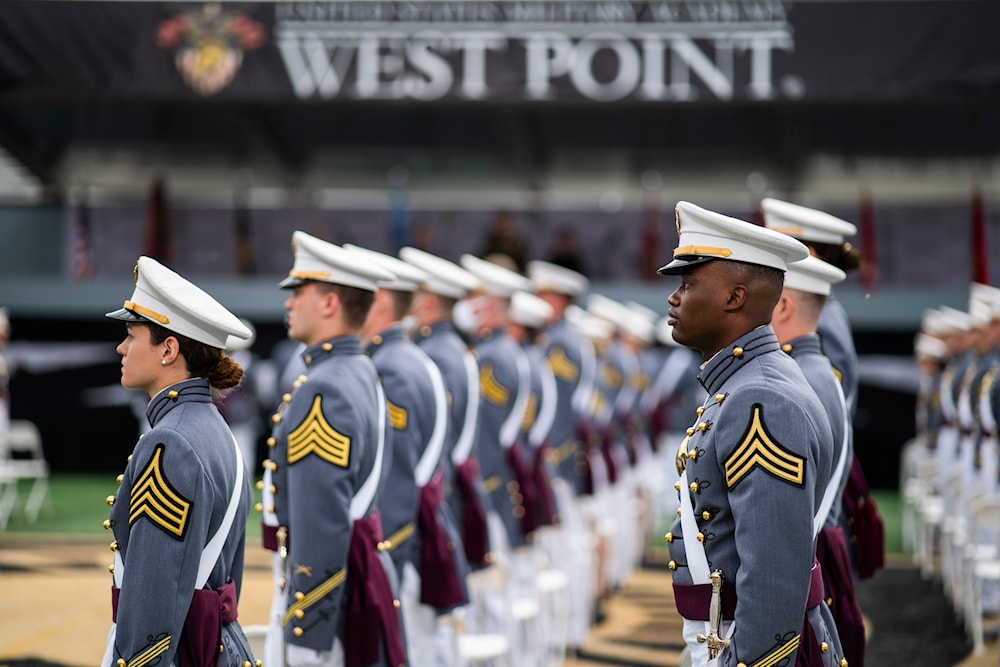US military academy can pursue admissions based on race
The Supreme Court’s decision on Friday is a response to a request by the Students for Fair Admissions group challenging West Point’s race-based admissions criterion.
-

United States Military Academy graduating cadets take position during their graduation ceremony of the US Military Academy class 2021 at Michie Stadium on Saturday, May 22, 2021, in West Point, NY (AP)
The federal Supreme Court rejected immediate changes to policies of the US Academy for Army Officers, West Point, which means that it can still consider race in its admission process.
The court’s decision on Friday came as a response to a request by a student group to change West Point’s admissions process, which takes race and a host of other factors as a test in its selection process for students aspiring to become army officers.
Students for Fair Admissions, the group that submitted the request, argued that the selection process was unconstitutional. Last year, the same group also challenged the race admission policies at Harvard and North Carolina, however, back then, the Supreme Court ruled in favor of the group and took down the policies.
The Supreme Court's order stated, “The record before this court is underdeveloped, and this order should not be construed as expressing any view on the merits of the constitutional question,” which means that the court did not reach a conclusive decision on whether institutions like West Point could use race-based criteria for admissions or not; it only denied immediately accepting the group's claim.
The US military’s academies, including West Point, the Naval Academy, the Air Force Academy, and the Coast Guard Academy, have all used race as a criterion for choosing cadets for many years in an attempt to show, through officer positions, the diversity of rank-and-file members of the military and the diversity of the US itself.
The solicitor general, Elizabeth Prelogar, announced to the Supreme Court in a hearing following a decision by a lower court also refusing to block the admission process at West Point, “Our nation’s military leaders have determined that a diverse army officer corps is a national security imperative and that achieving that diversity requires limited consideration of race in selecting those who join the army as cadets."
President of Students of Fair Admissions, Edward Blum, also stated, “It is disappointing that the young men and women who apply to West Point for the foreseeable future will have their race used as a factor to admit or reject them.” It is noteworthy that the group also challenged the admissions process at the Naval Academy.
“Every year this case languishes in discovery, trial, and appeals means that our nation’s best and brightest young men and women will be classified, sorted, and preferred based on their skin color rather than just on their abilities,” Blum added.
US Army: shrinking and weak
According to Newsweek, the United States Army size is apparently the smallest in size it has been since World War II, as the service struggles to attract new recruits.
As early as February 2023, the Pentagon admitted to difficulties in recruiting new people to the US Army.
The army declared on October 3 2023 that it had recruited about 55,000 soldiers in the fiscal year 2023, which ended on September 30, 2023, falling 10,000 recruits short of the publicly declared objective of 65,000.
On January 11 of this year, internal data from the Defense Department revealed a notable decline in the recruitment of white individuals to the US Army in recent years, according to a report by Military.com.
In 2018, the Army identified over 44,000 new recruits as white, but this figure had consistently decreased annually, dropping to around 25,000 white recruits in 2023, as detailed in the report.
The proportion of white individuals among Army recruits has seen a decline from 56.4% in 2018 to 44% in 2023, reflecting a significant shift over the years.
In addition, according to the Heritage Foundation's 10th annual Index of Military Strength, which came out on January 24, the "weak" US military is "at significant risk of being unable to meet the demands of a single major regional conflict while also attending to various presence and engagement activities."
The report graded each branch of service on its strength in capacity, competence, and preparedness, grading the branch power as either very weak, weak, marginal, strong, or very strong.
It detailed how nearly all branches of the US military cannot face a serious major war, with the Air Force rated as "very weak" in 2023, the lowest possible rating.

 4 Min Read
4 Min Read








